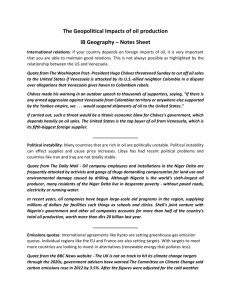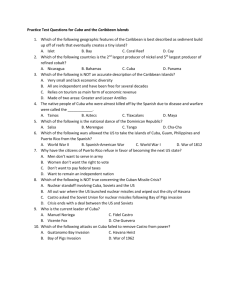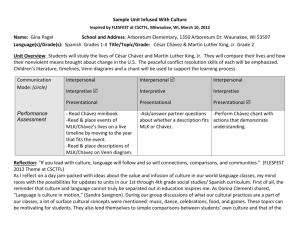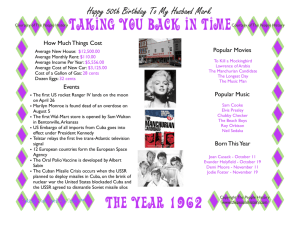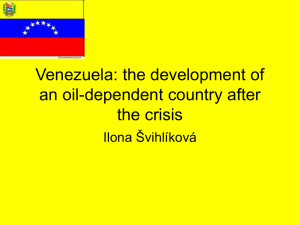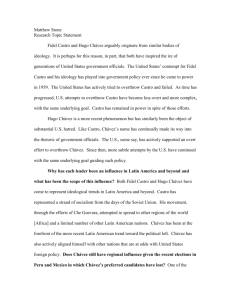Freedom in the World
advertisement
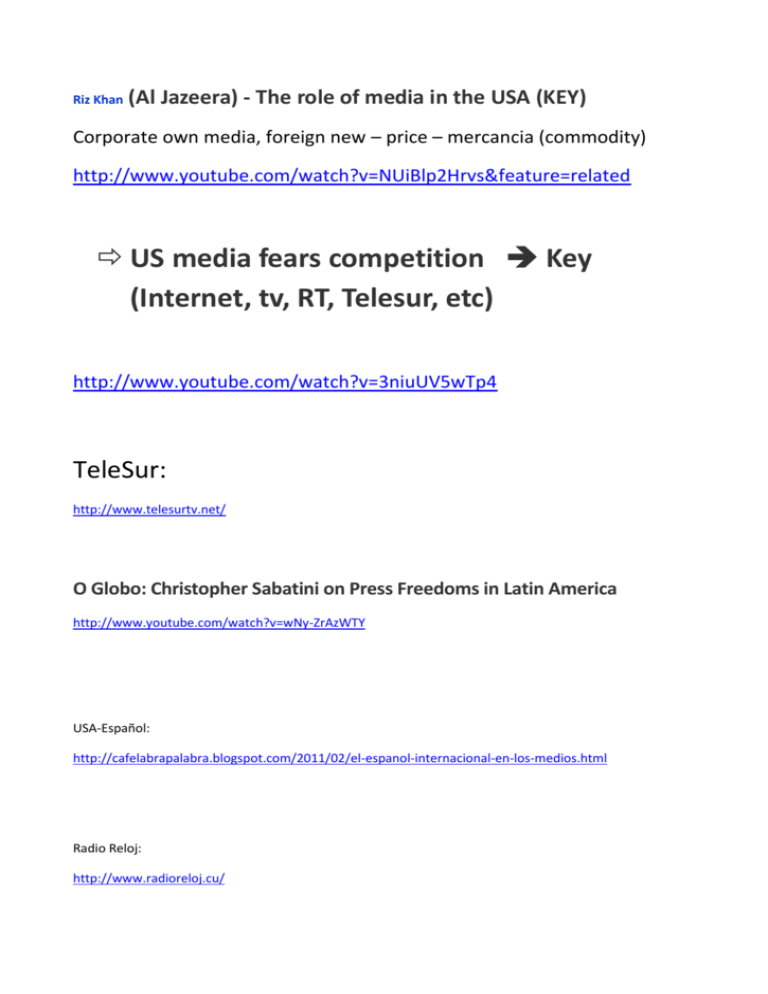
Riz Khan (Al Jazeera) - The role of media in the USA (KEY) Corporate own media, foreign new – price – mercancia (commodity) http://www.youtube.com/watch?v=NUiBlp2Hrvs&feature=related US media fears competition Key (Internet, tv, RT, Telesur, etc) http://www.youtube.com/watch?v=3niuUV5wTp4 TeleSur: http://www.telesurtv.net/ O Globo: Christopher Sabatini on Press Freedoms in Latin America http://www.youtube.com/watch?v=wNy-ZrAzWTY USA-Español: http://cafelabrapalabra.blogspot.com/2011/02/el-espanol-internacional-en-los-medios.html Radio Reloj: http://www.radioreloj.cu/ Radio Rebelde: http://www.radiorebelde.cu/# Radios: http://www.digiradio.ch/radiocuba/ Cubavisión: http://www.livetvcenter.com/tv_cubana_214.asp CubaNet (anticastro) http://www.cubanet.org/ Cubadebate (Red): IMPORTANTE –Discursos de Fidel, etc http://www.cubadebate.cu/ Randy Alonso, director del programa Mesa Redonda (TV cubana) y del sitio web Cubadebate http://www.youtube.com/watch?v=2vi1bgJW05I TVMartí: http://www.youtube.com/watch?v=xUl3pmElDXE Gloria Stefan, etc CNN (mismo tema: Fariñas): http://www.youtube.com/watch?v=9o54v4PIYK4&feature=related http://www.telesurtv.net/secciones/canal/senalenvivo.php CUBA, Cubanos en la Isla. Mujer canta. http://www.youtube.com/watch?v=ZfRpo04ca08&feature=related ANTICUBA: http://www.youtube.com/watch?v=71S8g7xz-Rg&feature=related http://www.youtube.com/watch?v=ZUHS9xbV2Bk&feature=related VENEZUELA: Marcel Granier: http://www.youtube.com/watch?v=q1TiLY0V5FE Informe: http://www.slideshare.net/miguelangelsantos/freedom-house-venezuela-javier-corrales Freedom House: http://www.freedomhouse.org/template.cfm?page=22&year=2011&country=8163 Venezuela http://www.freedomhouse.org/report/freedom-world/2013/cuba Cuba Amnesty International: http://www.freedomhouse.org/template.cfm?page=22&year=2010&country=7807 http://www.amnesty.org/en/region/venezuela/report-2009 Cortos venezolanos: Falta Buho http://www.youtube.com/watch?v=9R4mPALMglQ&feature=related ¿Esto es vida? http://www.youtube.com/watch?v=qo0E97hpxZ0&feature=related La Tesis http://www.youtube.com/watch?v=mweQXjLSHKE&feature=related Entrevista de Jaime Bayly a Armando de Armas (Part.I) http://www.youtube.com/watch?v=oPsRawZLN8I Rosa Miriam Elizalde habla en la Televisión Cubana de la censura a Cubadebate, medio de Cuba http://www.youtube.com/watch?v=U7JgIRcbWTQ Un comentario : Let's be honest here - Cubans have access to the internet but it is expensive. That is the problem. I have tried accessing different anti-Castro stuff in different places in Cuba and never had a problem. I'm not saying censorship of the net does not exist but it is an absolute lie to imply - as the Canadian and US media do along with scores of ordinary people - that Cubans don't have "access" to the net. Caso USA: introducción por aproximación Who is it about? What happened (what's the story)? Where did it take place? When did it take place? Why did it happen? Who owns the media (paper, tv, radio, internet site (Facebook, My space, Twitter, etc)? What agenda dominates information flows? Where is the real power of decision-making? When changes the limits of the journalists (When does the journalist starts censoring himself/herself )? Why the media has a relevant/important/big audience? (i.e. Bloomberg) US media fears competition Key (Internet, tv, RT, Telesur, etc) http://www.youtube.com/watch?v=3niuUV5wTp4 On the occasion of RFE´s 60th anniversary[20] in Washington DC (sept 2010), Walter Isaacson (appointed by B.Obama the chairman of the Broadcasting Board of Governors), says about RT, Presstv (Iran), CCTV (China), and Telesur (pan-Latin American): "we can't allow ourselves to be out-communicated by our enemies..." (wiki) Congress censors Arab news media (RT, key) http://www.youtube.com/watch?v=aK4_F9KSeqo&feature=related Eduardo Galeano: http://www.youtube.com/watch?v=KAC6xs5Gi2s Eduardo Galeano: los medios de comunicación engañan al pueblo http://www.youtube.com/watch?v=VtGKLR2E0LE O Globo: Christopher Sabatini on Press Freedoms in Latin America http://www.youtube.com/watch?v=wNy-ZrAzWTY Print Freedom in the World - Cuba (2011) Capital: Havana Population: 11,225,000 Political Rights Score: 7 * Civil Liberties Score: 6 * Status: Not Free Overview After prolonged negotiations with the Roman Catholic Church and the Spanish government, Cuban authorities in 2010 began releasing the 52 remaining political prisoners from a 2003 crackdown on independent journalists and dissidents. In September, the government announced that it would lay off 500,000 employees, about 10 percent of the country’s labor force, and opened 178 activities and professions for self-employment and private cooperatives. In November, President Raúl Castro announced that the long-delayed sixth congress of the Cuban Communist Party would be held in April 2011. Cuba achieved independence from Spain in 1898 as a result of the Spanish-American War. The Republic of Cuba was established in 1902 but remained under U.S. tutelage until 1934. In 1959, the U.S.-supported dictatorship of Fulgencio Batista, who had ruled Cuba for 18 of the previous 25 years, was overthrown by Fidel Castro’s July 26th Movement. Castro declared his affiliation with communism shortly thereafter, and the island has been governed by a one-party state ever since. Following the 1991 collapse of the Soviet Union and the end of roughly $5 billion in annual Soviet subsidies, Castro opened some sectors of the economy to direct foreign investment. The legalization of the U.S. dollar in 1993 created a new source of inequality, as access to dollars from remittances or through the tourist industry enriched some, while the majority continued to live on peso wages averaging less than $10 a month. Meanwhile, the authorities remained highly intolerant of political dissent, enacting harsh new sedition legislation in 1999 and mounting a series of campaigns to undermine the reputations of leading opposition figures by portraying them as agents of the United States. In 2002, the Varela Project, a referendum initiative seeking broad changes in the socialist system, won significant international recognition. However, the referendum proposal was rejected by the constitutional committee of the National Assembly, and the government instead held a counter-referendum in which 8.2 million people supposedly declared the socialist system to be “untouchable.” The government initiated a crackdown on the prodemocracy opposition in March 2003. Seventy-five people, including 27 independent journalists, 14 independent librarians, and dozens ofsignature collectors for the Varela Project, were sentenced to an average of 20 years in prison following one-day trials held in April. On July 31, 2006, Fidel Castro passed power on a provisional basis to his younger brother, defense minister and first vice president Raúl Castro, after internal bleeding forced him to undergo surgery and begin a slow convalescence. The 81-year-old Fidel resigned as president in February 2008, and Raúl, 76, formally replaced him. Though officially retired, Fidel continued to write provocative newspaper columns and remained in the public eye through the release of carefully selected photographs and video clips. The government approved a series of economic reforms in March 2008. These included allowing ordinary Cubans to buy consumer electronic goods and stay in the country’s top tourist hotels. After introducing a plan in April that permitted thousands of Cubans to receive titles to their homes, the government eliminated salary caps and raised pensions for the country’s more than two million retirees. The state also began granting farmers a larger role in decisions about land use. In late August and early September, however, Cuba was struck by two hurricanes, and a global economic downturn began shortly thereafter, sending the Cuban economy into a crisis that halted the tentative reform process. In 2009, the government began to distribute land leases to agricultural workers, but other key aspects of the reform agenda remained stalled. Cuba’s heavy dependence on imports led to a shortage of foreign exchange, forcing layoffs and closures at many state enterprises, and the threat of blackouts led to electricity rationing during the summer. Raúl Castro continued a series of significant cabinet shuffles in 2010, removing the minister of basic industries in September. The changes, which had begun in 2008, included the appointment of an unprecedented number of military officers to lead key economic ministries responsible for transport, the sugar industry, and CIMEX, the largest state-owned corporation in Cuba. The authorities also pressed forward with economic reforms during the year. In August the government approved an initiative that allowed foreign investors to obtain 99-year property leases. In a September interview with a U.S. magazine, Fidel Castro declared that the “Cuban economic model doesn’t even work for us anymore,” a statement that was widely interpreted as a show of support for his brother’s reform efforts. A few days later it was announced that more than half a million workers, or 10 percent of the country’s labor force, would be laid off from public-sector jobs, while 178 economic activities would be opened up to self-employment and private-sector participation. In October the government began issuing licenses for self-employment (cuentapropistas). It also stated that entrepreneurs would be levied a 35 percent income tax, among other taxes, and that rural and other cooperatives would receive further incentives. Officials announced in November that the long-delayed sixth congress of the Cuban Communist Party would be held in April 2011, with the stated aim of discussing the direction and content of the ongoing economic restructuring. Cuba continued to deny political and civil liberties to regime opponents in 2010. However, harassment and short-term detentions replaced long prison terms as the preferred form of repression, and some dissidents won reprieves from the government. In February, imprisoned dissident Orlando Zapata Tamayo died after a hunger strike he had begun in December. Other political prisoners began their own hunger strikes amid international outrage over the death. Negotiations between the Cuban government, the Roman Catholic Church, and the Spanish government subsequently resulted in a July agreement to release the remaining 52 of the 75 political prisoners jailed in 2003. U.S. government contractor Alan Gross, who had been arrested in December 2009 for distributing communications equipment to religious organizations, remained behind bars in 2010 without formal charges being filed. Meanwhile, despite ongoing bilateral negotiations, the U.S. government took no concrete steps to remove travel and other restrictions on the island. Political Rights and Civil Liberties Cuba is not an electoral democracy. Longtime president Fidel Castro and his brother, current president Raúl Castro, dominate the one-party political system, in which the Communist Party of Cuba (PCC) controls all government entities. The 1976 constitution provides for a National Assembly, which designates the Council of State. That body in turn appoints the Council of Ministers in consultation with its president, who serves as chief of state and head of government. Raúl Castro is now president of the Council of Ministers and the Council of State, and commander in chief of the armed forces. As of 2010, Fidel was presumed to remain first secretary of the PCC. The most recent PCC congress was held in 1997; in November 2010, the next congress was scheduled for April 2011. In the January 2008 National Assembly elections, as in previous elections, voters were asked to either support or reject a single candidate for each of the 614 seats. All candidates received the requisite 50 percent approval, with Raúl Castro winning support from over 99 percent of voters. In April 2010, Cuba held elections for the approximately 15,000 delegates to the country’s 169 Popular Municipal Assemblies, or municipal councils, which are elected every two and a half years. All political organizing outside the PCC is illegal. Political dissent, whether spoken or written, is a punishable offense, and dissidents frequently receive years of imprisonment for seemingly minor infractions. The regime has also called on its neighbor-watch groups, known as Committees for the Defense of the Revolution, to strengthen vigilance against “antisocial behavior,” a euphemism for opposition activity. Dissident leaders have reported intimidation and harassment by state-sponsored groups. The absolute number of political prisoners in Cuba decreased from 201 in 2009 to 167 in July 2010. The government agreed in July to release the remaining 52 people arrested in the March 2003 crackdown on independent journalists, librarians, and other activists. Those released went into exile in Spain, but the government missed a November 7 deadline for all 52 to be released, as a final group of 13 prisoners refused to agree to leave Cuba. As of December 2010, the November deadline still had not been met. The Damas de Blanco, a group of female relatives of the 2003 political prisoners, continued their protests during the year despite repeated episodes of harassment from authorities and regime supporters. Meanwhile, 12 “prisoners of conscience” remained in Cuba under “extra-penal” license, a form of parole granted to prisoners facing health or other problems that may have arisen during their incarceration. Official corruption remains a serious problem, with a culture of illegality shrouding the mixture of private and state-controlled economic activities that are allowed on the island. The Raúl Castro government has made the fight against corruption an important priority. In July 2010, Chilean businessman and former Castro associate Max Marambio was summoned to Havana to testify in an investigation of alleged fraud in a joint Cuban-Chilean agribusiness enterprise after his representative in Havana was found dead in his apartment in April; Marambio never appeared to testify in Havana. Chilean authorities declined to carry out an interrogation, citing irregularities in the process. Cuba was ranked 69 out of 178 countries surveyed in Transparency International’s 2010 Corruption Perceptions Index. The news media are controlled by the state and the PCC. The government considers the independent press to be illegal and uses Ministry of Interior agents to infiltrate and report on the outlets in question. Independent journalists, particularly those associated with the dozen small news agencies that have been established outside state control, are subjected to terms of hard labor and assaults by state security agents. Foreign news agencies may only hire local reporters through government offices, limiting employment opportunities for independent journalists. Nevertheless, some state media, such as the newspaper Juventud Rebelde, have begun to cover previously taboo topics, such as corruption in the health and education sectors. Access to the internet remains tightly controlled, and it isdifficult for most Cubans to connect from their homes. Websites are closely monitored, and while there are state-owned internet cafes in major cities, the costs are prohibitive for most residents. Only select state employees have workplace access to e-mail and restricted access to websites deemed inappropriate by the Ministry of Communications. There are an estimated 25 independent, journalistic bloggers working on the island. Although they have faced some episodes of harassment, they have avoided close links to dissidents and are not subject to the same type of systematic persecution as other independent journalists. Blogger Yoani Sánchez has emerged as a worldwide celebrity, though few within Cuba can access the ironic and critical musings about life in Cuba on her popular blog, Generation Y. In 1991, Roman Catholics and other believers were granted permission to join the PCC, and the constitutional reference to official atheism was dropped the following year. The Catholic Church has been playing an increasingly important civil society role, mediating in the case of the 2003 political prisoners, enabling discussion of topics of public concern, and offering material assistance to the population, especially in the countryside. In November 2010, the Church inaugurated its first seminary in the country since the 1959 revolution. However, official obstacles to religious freedom remain substantial. Churches are not allowed to conduct ordinary educational activities, and many church-based publications are subject to censorship by the Office of Religious Affairs. While Roman Catholicism is the traditionally dominant faith, an estimated 70 percent of the population practices some form of Afro-Cuban religion. And as in the rest of Latin America, Protestantism is making rapid gains in Cuba. The government restricts academic freedom. Teaching materials for subjects including mathematics and literature must contain ideological content. Affiliation with PCC structures is generally needed to gain access to educational institutions, and students’ report cards carry information regarding their parents’ involvement with the party. Limited rights of assembly and association are permitted under the constitution. However, as with other constitutional rights, they may not be “exercised against the existence and objectives of the Socialist State.” The unauthorized assembly of more than three people, even for religious services in private homes, is punishable with up to three months in prison and a fine. This rule is selectively enforced and is often used to imprison human rights advocates. Workers do not have the right to strike or bargain collectively. Members of independent labor unions, which the government considers illegal, are often harassed, dismissed from their jobs, and barred from future employment. The Council of State, led by Raúl Castro, controls both the courts and the judicial process as a whole. Beginning in 1991, the United Nations voted annually to assign a special investigator on human rights to Cuba, which consistently denied the appointee a visa. In 2007, the UN Human Rights Council ended the investigator position for Cuba. However, Raúl Castro authorized Cuban representatives to sign two UN human rights treaties in February 2008. Cuba does not grant international humanitarian organizations access to its prisons. Afro-Cubans have frequently complained about widespread discrimination by government and law enforcement officials. Many Afro-Cubans have only limited access to the dollar-earning sectors of the economy, such as tourism and joint ventures with foreign companies. Freedom of movement and the right to choose one’s residence and place of employment are severely restricted. Attempting to leave the island without permission is a punishable offense. Intercity migration or relocation requires permission from the local Committee for the Defense of the Revolution and other authorities. Recent economic reforms offering a variety of incentives for rural production hint at a possible attempt to stem the historical tide of migration from the countryside to Havana. Onlystate enterprises can enter into economic agreements with foreigners as minority partners; ordinary citizens cannot participate. PCC membership is still required to obtain good jobs, suitable housing, and real access to social services, including medical care and educational opportunities. Cuba positioned itself at the forefront of the gay rights movement in Latin Americain 2008, due in part to the advocacy of Mariela Castro, Raúl Castro’s daughter. The government helped to sponsor an International Day Against Homophobia that featured shows, lectures, panel discussions, and book presentations, while the Ministry of Public Health authorized government-provided sex-change surgeries for transsexuals. By 2009, officials were debating the possible approval of artificial insemination for lesbians who wished to bear children. Cuba had already been considered the best performer in Latin America in terms of gender equality. About 40 percent of all women work in the official labor force, and they are well represented in most professions. Print Freedom in the World - Venezuela (2011) Capital: Caracas Population: 28,800,000 Political Rights Score: 5 * Civil Liberties Score: 5 * Status: Partly Free Ratings Change Venezuela’s civil liberties rating declined from 4 to 5 due to a raft of legislation that granted President Hugo Chávez Frias wide-ranging decree powers, tightened restrictions on civil society and the media, and attempted to vitiate opposition gains in September 2010 parliamentary elections. Overview Opposition candidates won a majority of the votes in parliamentary elections held in September 2010, but electoral rules that favor the ruling party allowed the government to retain its legislative majority. Prior to the end of the 2006–10 parliamentary term, legislators passed 13 new laws on topics including civil society, the media, and subnational government structures. President Hugo Chávez Frias was also granted wide-ranging decree powers for 18 months. The Republic of Venezuela was founded in 1830, nine years after independence from Spain. Long periods of instability and military dictatorship ended with the establishment of civilian rule in 1958 and the approval of a constitution in 1961. Until 1993, the center-left Democratic Action (AD) party and the Social Christian Party (COPEI) dominated politics under an arrangement known as the Punto Fijo pact. President Carlos Andrés Pérez (1989–93) of the AD, already weakened by the violent political fallout from his free-market reforms, was nearly overthrown by Lieutenant Colonel Hugo Chávez Frias and other nationalist military officers in two 1992 coup attempts, in which dozens of people were killed. Pérez was subsequently impeached as a result of corruption and his inability to stem the social consequences of economic decline, which had coincided with lower oil prices beginning in the 1980s. Rafael Caldera, a former president (1969–74) and founder of COPEI, was elected president in late 1993 as head of the 16-party Convergence coalition, which included both left- and right-wing groups. Chávez won the 1998 presidential contest on a populist, anticorruption platform, and in 1999 voters approved a new constitution that strengthened the presidency and introduced a unicameral National Assembly. Although Chávez retained his post in elections held under the new charter in 2000, opposition parties won most governorships, about half of the mayoralties, and a significant share of the National Assembly seats. In April 2002, following the deaths of 19 people in a massive antigovernment protest, dissident military officers attempted to oust Chávez, the vice president, and the National Assembly with backing from some of the country’s leading business groups. However, the coup was resisted by loyalist troops and protesters, and Chávez moved swiftly to regain control of the military, replacing dozens of senior officers. The country was racked by continued protests, and in December 2002 opposition leaders called a general strike that lasted 62 days but ultimately weakened their political position as well as the economy. While fending off his opponents with legal maneuvers and intimidation tactics, Chávez launched bold social-service initiatives, including urban health and literacy projects, many of which were staffed by thousands of experts from Cuba. He also continued to focus on increasing his influence over the judiciary, the media, and other institutions of civil society. Chávez survived a 2004 presidential recall referendum triggered by an opposition signature campaign, taking 58 percent of the vote amid high turnout. National Assembly elections in 2005 were boycotted by the opposition, which accused the National Electoral Council(CNE) of allowing violations of ballot secrecy. A mere 25 percent of eligible voters turned out, and all 167 deputies in the resulting National Assembly were government supporters, though a small number defected to the opposition in subsequent years. In the 2006 presidential election, Chávez defeated Zulia state governor Manuel Rosales of the opposition A New Time party, 61 percent to 38 percent. The incumbent exploited state resources during the campaign and drew on enduring support among poorer Venezuelans who had benefited from his social programs. Soon after the vote, Chávez pressed forward with his program of institutional changes. Nearly all progovernment parties merged into the Unified Socialist Party of Venezuela (PSUV), and the socialist “Bolivarian revolution” deepened economically with a series of nationalizations of private assets. At the end of January 2007, the National Assembly voted to allow the president to issue decrees on a broad array of topics for 18 months. Referendum voters in December 2007 narrowly defeated a package of constitutional amendments, among them the removal of presidential term limits. The vote reflected robust opposition participation, public disappointment with rising inflation and crime rates, and a degree of disaffection among current and former Chávez supporters. However, a set of 26 new laws decreed by Chávez in July 2008 appeared designed to institute measures that were rejected in the referendum, including presidential authority to name new regional officials and the reorganization of the military hierarchy. State and local elections in November 2008 were preceded by the disqualification of over 300 candidates, including some opposition leaders, by the nominally independent but government-friendly comptroller. PSUV and other Chávez-aligned candidates enjoyed massive resource advantages and state publicity, while opposition candidates focused on perceived failures in public services and benefited from coverage in the opposition press. In balloting that was deemed fair by the Organization of American States (OAS), the opposition captured the mayoralty of greater Caracas as well as Venezuela’s second-largest city and 5 of 22 states, including the three richest and most populous. Meanwhile, government candidates won 17 states and some 80 percent of the mayoralties. Following the elections, Chávez moved forward with plans for a new referendum on abolishing term limits. The government’s efforts included mobilization of state resources and pressure on public employees, as well as arguments that only a continuation of the Bolivarian revolution would assure social services and political power for poorer Venezuelans. The February 2009 poll was characterized by observers as generally free, and Chávez prevailed with over 54 percent of the vote. In March and April 2009, the legislature passed laws allowing the national government to strip states of key governing functions and cut budget allocations; in practice, opposition-governed states and particularly the Caracas mayor’s office were most affected. In August, the National Assembly passed a new electoral law that was generally perceived to favor government candidates. Battles between the government and the media continued. In July, the National Telecommunications Commission (CONATEL) stripped 32 radio stations of their licenses for what it described as procedural and administrative problems. The primary opposition-aligned television broadcaster, Globovisión, faced a number of investigations in 2009, and in 2010 the government charged its president, Guillermo Zuloaga, with several violations, prompting him to seek exile in the United States. In December the government took a minority ownership position in the company following the takeover of a bank that held a 20 percent share. Also in 2010, the surviving cable version of another opposition-oriented television station, RCTV, was shut down for various alleged violations, including the refusal to broadcast official speeches. RCTV’s terrestrial broadcast frequency and equipment had been seized in 2007, based on what Chávez claimed were the station’s ongoing efforts to destabilize the government. Elections to the National Assembly in September dominated the political agenda in 2010. The PSUV benefitted from significant exposure on state-run media and pressure on public employees and neighborhood groups to vote for government-backed candidates. According to the opposition and civic groups, the 2009 electoral law also allowed the Chavista-dominated CNE to gerrymander districts in favor of the PSUV. Nonetheless, the opposition, grouped as the Unity Roundtable (MUD),was able to agree on common candidates and themes. In the end, the MUD took more than 47 percent of the vote, the PSUV captured 48 percent, and the independent but opposition-leaning Fatherland for All (PPT) party obtained over 3 percent. Due to the revised electoral rules, however, PSUV candidates secured 98 of the 165 seats, MUD candidates took 65, and the PPT won the remaining two. Final results showed that while opposition candidates benefitted from the electoral changes in some states, PSUV candidates won approximately 10 more seats than they would have under previous rules. Following the loss of the PSUV supermajority in the National Assembly, Chávez urged lame-duck lawmakers to enact a raft of new legislation before leaving office. Over 20 laws were passed or modified in December, including highly controversial regulations related to the internet, funding for civil society groups, education, procedural issues within the National Assembly, territorial reorganization, and the distribution of resources to subnational governments and community groups. In addition, the legislature voted to grant Chávez wide-ranging decree powers for 18 months. Venezuelan relations with neighboring Colombia recovered in 2010 following a period in 2009 in which tensions briefly sparked fears of military conflict. Interpersonal friction between Chávez and Colombian president Álvaro Uribe was an important factor behind the rift, and the inauguration of Uribe’s successor, Juan Manuel Santos, in August 2010 led to a rapid détente. Relations with the United States were stable but tense, and the United States remained without an ambassador in Caracas after Venezuela refused to accept the appointment of Larry Palmer. Over the past several years, Chávez has increased friction with the United States and its allies by creating ostensible leftist alternatives to U.S.-backed regional trade pacts, garnering regional support with generous oil subsidies, seeking weapons purchases and other cooperation from Iran and Russia, and either explicitly or tacitly supporting favored electoral candidates in neighboring countries. Political Rights and Civil Liberties Venezuelais not an electoral democracy. While the act of voting is relatively free and the count is fair, the political playing field favors government-backed candidates, and the separation of powers is nearly nonexistent. The opposition boycotted the 2005 National Assembly elections due to concerns that ballot secrecy would be compromised. After the failed 2004 presidential recall referendum, tens of thousands of people who had signed petitions in favor of the effort found that they could not get government jobs or contracts, or qualifyfor public assistance programs; they had apparently been placed on an alleged blacklist of President Hugo Chávez Frias’s political opponents. The opposition decided to actively contest the 2006 presidential and 2010 National Assembly elections, and the voting was generally considered free and fair, but the CNE wasineffectual at limiting use of state resources by Chávez and the PSUV. They enjoyed a massive advantage in television exposure, and the promotion of social and infrastructure projects often blurred the line between their official roles and their electoral campaigns. Public employees were also subjected to heavy pressure to support the government. Public resources were similarly exploited ahead of the referendum balloting in both 2007 and 2009, and while the polls were conducted largely without incident, full and final results, which could have allayed any lingering suspicions, were not released. The unicameral, 165-seat National Assembly is popularly elected for five-year terms. Chávez’s control of the 2006–10 assembly allowed him to further curb the independence of institutions including the judiciary, the intelligence services, and the Citizen Power branch of government, which was created by the 1999 constitution to fight corruption and protect citizens’ rights. The December 2010 grant of decree powers to Chávez was the third time he received such authority. The president serves six-year terms, but due to the results of the 2009 referendum, he and other elected officials are no longer subject to term limits. The merger of government-aligned parties into the PSUV is largely complete, though several groups retain nominal independence. While the opposition considered the 2008 state and local elections a comeback, its victories were blunted by new laws allowing the national government to strip important functions from subnational administrations. In 2009, opposition parties established the MUD, which selected unity candidates— partially via primaries—for the 2010 elections and maintained cohesion during the campaign. Soon after the elections, the PPT, which won 2 seats, initiated talks with the MUD. The government plays a major role in the economy and has done little to remove vague or excessive regulatory restrictions that increase opportunities for corruption. As many as 12 development funds, some very large, are controlled by the executive branch without independent oversight. The government’s sporadic anticorruption efforts focus on its political opponents; former defense minister and Chávez critic Raúl Isaías Baduel was convicted in April 2010 and sentenced to eight years in prison. Another major corruption scandal during the year focused on the food-distribution arm of the national oil company, after thousands of tons of food were discovered rotting in various ports. Significant proportions of the food division’s purchases were apparently never even shipped. Transparency International ranked Venezuela 164 out of 178 countries surveyed in its 2010 Corruption Perceptions Index. Although the constitution provides for freedom of the press, the media climate is permeated by intimidation,sometimes including physical attacks, and strong antimedia rhetoric by the government is common. The 2004 Law on Social Responsibility of Radio and Television gives the government the authority to control radio and television content.Opposition-oriented outlets make up a large portion of the print media, but their share of the broadcast media has declined in recent years. Coverage of election campaigns by state media has been overwhelmingly biased in favor of the government; private outlets have also exhibited bias, though to a somewhat lesser degree. In August 2010, the publication of photographs showing corpses piled in a morgue led to a court ruling barring the media from disseminating violent images for a month. The ruling came in the middle of the campaign for parliamentary elections, in which crime was a major issue. The government does not restrict internet access, but a law passed during the December 2010 lame-duck session of the National Assembly extended the 2004 broadcasting law’s restrictions to the internet. Another law passed during the session tightened licensing restrictions for broadcast media. Constitutional guarantees of religious freedom are generally respected, though government tensions with the Roman Catholic Church remain high. Government relations with the small Jewish community have also been strained, but a round of dialogue was undertaken in 2010. Academic freedom has come under mounting pressure in recent years, with the formulation of a new curriculum that emphasizes socialist concepts. A new Organic Education Law enacted in 2009 was praised for provisions that explicitly detailed the state’s obligations, but criticized over ambiguities that could lead to restrictions on private education and increased control by the government and communal councils. In universities, elections for student associations and administration positions have become more politicized, and rival groups of students have clashed repeatedly over both academic and political matters. Freedom of peaceful assembly is guaranteed in the constitution, but the right to protest has become a sensitive topic in recent years. The rise of the student movement in 2007 caused a spike in confrontations with the government, but in 2010 it was workers, particularly employees of state-owned enterprises, who demonstrated most frequently, followed by citizens protesting poor public-services delivery and high crime rates. The state’s harsh rhetorical and legal response has fallen most heavily on the labor sector. According to the rights group Provea, however, the number of protests repressed by police declined in 2010. An easing of the economic recession during the year led to a small drop in street protests after a significant increase in 2009, though rights groups decried the August death of hunger striker Franklin Brito and the continued criminalization of protest. In 2000, the Supreme Tribunal of Justice ruled that nongovernmental organizations (NGOs) with non-Venezuelan leaders or foreign government funding are not part of “civil society.” As a result, they may not represent citizens in court or bring their own legal actions. The government has also made an effort to undermine the legitimacy of human rights and other civil society organizations by questioning their ties to international groups. The rights group Cofavic denounced 77 attacks on civil society members between 2007 and 2010. In December 2010, the lame-duck parliament passed the Law on Political Sovereignty and National Self-Determination, which threatens sanctions against any “political organization” that receives foreign funding or hosts foreign visitors who criticize the government. Workers are legally entitled to form unions, bargain collectively, and strike, with some restrictions on publicsector workers’ ability to strike. Control of unions has increasingly shifted from traditional opposition-allied labor leaders to new workers’ organizations. Antigovernment groups allege that Chávez intends to create governmentcontrolled unions, while the president’s supporters maintain that the old labor regime was effectively controlled by the AD, COPEI, and employers. The growing competition has contributed to a substantial increase in labor violence as well as confusion during industry-wide collective bargaining. Labor strife has also risen due to the addition of thousands of employees of nationalized companies to the state payroll and the government’s failure to implement new collective-bargaining agreements in a context of reduced state resources. The government encourages the formation of workers’ militias and socialist patrols to deepen the “revolution” within industrial enterprises. Politicization of the judicial branch has increased under Chávez, and high courts generally do not rule against the government. Conviction rates remain low, the public-defender system is underfunded, and nearly half of all judges lack tenure. The National Assembly has the authority to remove and appoint judges to the Supreme Tribunal of Justice, which controls the rest of the judiciary. In December 2010 the outgoing legislature appointed nine new Supreme Court judges who are generally viewed as friendly to the government. Judge Maria Lourdes Afiuni remained in detention throughout 2010, having been arrested on corruption charges in December 2009 just hours after ordering the release of a prominent banker who had been held without conviction for more than the maximum of two years. At approximately 48 homicides per 100,000 inhabitants, Venezuela’s murder rate is now one of the world’s highest. The police and military have been prone to corruption, widespread arbitrary detention and torture of suspects, and extrajudicial killings. In 2009, the justice minister admitted that police were involved in up to 20 percent of crimes. Although hundreds of officers are investigated each year, few are convicted, partially due to a shortage of prosecutors. A plan to modify and purge the police was completed in early 2008, and pilot operations involving a new force trained in human rights began in 2010. Although the prison budget has moderately increased and pretrial detention has been limited to two years, prison conditions in Venezuela remain among the worst in the Americas. The NGO Venezuelan Prison Observatory reported 476 violent deaths within prison walls in 2010, a 30 percent increase from the 2009 toll. The increasingly politicized military has stepped up its participation in social development and the delivery of public services. While a faction of the military is perceived as wary of the Bolivarian project, Chávez’s institutional control is solid. One top general, Henry Rangel Silva, remarked in November 2010 that the military was “married” to the Bolivarian revolution, and he was subsequently promoted. Foreign officials assert that the military has adopted a permissive attitude toward drug trafficking and Colombian rebel activity inside Venezuela. In recent years, the division of responsibility between the military and civilian militias has become less clear, and informal progovernment groups have been responsible for attacks on press outlets and, occasionally, individual journalists and opposition supporters. Property rights are affected by the government’s penchant for nationalization, and the pace of nationalization accelerated in 2010, with over 200 businesses as well as farms and buildings expropriated by the government. The August nationalization of the dominant supplier of agricultural inputs, Agroisleña, gave the government a powerful new position in food production. The formal rights of indigenous people have improved under Chávez, though such rights are seldom enforced by local political authorities. The constitution reserves three seats in the National Assembly for indigenous people and provides for “the protection of indigenous communities and their progressive incorporation into the life of the nation.” Indigenous communities trying to defend their land rights are subject to abuses, particularly along the Colombian border. Women enjoy progressive rights enshrined in the 1999 constitution, as well as benefits offered under a major 2007 law. Rights groups reported some improvements in implementation in 2010. Meanwhile, domestic violence and rape remain common and are rarely punished in practice. The problem of trafficking in women remains inadequately addressed by the authorities. Women are poorly representedin government, with just 17 percent of the seats in the National Assembly. *Countries are ranked on a scale of 1-7, with 1 representing the highest level of freedom and 7 representing the lowest level of freedom..
